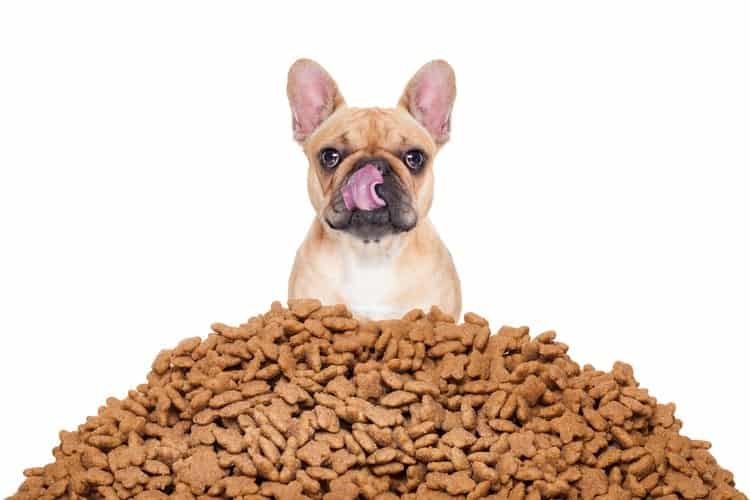One of the best ways to keep our pets healthy is to give them the right amount of food. If we give them less food than they need, they can suffer nutritional deficiencies, and doing the opposite can end up having dire consequences, among others, they may end up suffering from obesity. If this topic worries you and you want to know how much food you should give your dog and how often, we give you a hand, read on.

I. How much daily food does my dog need?
Unfortunately, there is no easy way to calculate exactly how much dogs should eat in a personalized way. Determining the right amount of food for your dog will depend on:
- Its size.
- The type of feeding.
- A number of times you eat per day.
- Your metabolism
- The amount of exercise you do.
To start calculating the recommended daily amount, check out the feeding guide that appears on the label of your dog food. The information it contains will give you some data similar to these:
- Dogs of breed mini or toy: If your hairy weighs about 2 or 3 kg, the ideal is that the daily amount ranges between 50 and 90 g of feed.
- Small breed dogs: Small breed dogs weigh between 3 and 10 kg in weight. For these kids, you will have to provide them with a daily ration between 90 and 190 g of feed.
- Medium-breed dogs: They are considered medium-sized dogs from 10 kg to 20 kg. In this case, the recommended daily amount is 190 to 310 g of feed.
- Dogs of large breeds: They range from 20 to 40 kg in weight. Its daily ration ranges between 500 and 590 grams of feed.
- Dogs of giant breeds: The big ones exceed 50 kg of weight. They will need a dose between 590 and 800 grams.
Remember that you can always combine dry food with wet food. Use the cans as a complement to brighten up your menu. And again, always follow the manufacturer’s recommendations considering that these amounts are daily. Do not put that amount at every meal! Divide it! It is also important to keep in mind that if we give you the daily recommended amount by the manufacturer, your dog will have the 100% energy it needs per day. If you also give him prizes and treats, chances are that your dog tends to gain weight.
II. How often should I feed my dog?
Once we have solved the dilemma of the daily food ration that I should give my dog, it is time to determine how many times a day we have to feed our pet. Unless otherwise indicated, the amounts just noted are those recommended for a healthy dog for a period of 24 hours. The frequency will vary depending on the size and age of the dog, but also on their specific habits and needs. So, again, there is no exact rule to determine how often you should feed your pet. You can use the following data to guide you:
1. Puppies
If your question is how many times to feed a puppy, you will have to rely on age groups.
- If your puppy is in the transition stage between weaning and the step to solid food (around 8 weeks) you should give between 4 and 6 meals a day.
- Between 8 weeks and 3 months, you can reduce to 4 meals a day.
- When he turns 4 and until 6 months he starts giving him 2 to 3 meals a day.
- And finally, after 6 months, two meals a day (depending on race).
2. Small Breed Dogs
We must avoid leaving the bowl full all day to these little ones since they tend to eat it all with great anxiety and the owners fall into the error of feeding them again and by this rule of three, they can become overweight. It is best that you divide your daily ration four or five times a day.
3. Medium Breed Dogs
Most adult dogs should eat twice a day so logically you will have to divide the daily amount into two.
4. Large Breed Dogs
As with medium dogs, the idea is to divide your ration into two shots. We must ensure that they do not binge. And never give them more food than the manufacturer’s label. And finally, do not forget those dogs that are already in the senior stage. These dogs, because of their age, usually lead a quieter and sedentary life, so it is advisable to change the specific feed for older dogs, a feed adapted to their age will contain the necessary calories and nutrients and help them not to get overweight.
III. Final Words
In any case, if you are strictly fulfilling these measures and your dog tends to get fat or lose weight, rather than adjust the ration on your own, it will be better to go to a veterinary clinic to make an assessment.
